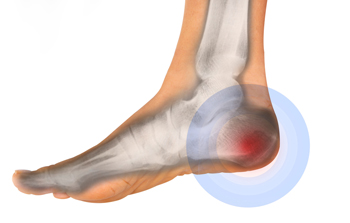 The portion of the ligament that connects the toes to the heel bone is referred to as the plantar fascia. If this tissue should become inflamed, a condition that is known as plantar fasciitis may develop. This uncomfortable and painful ailment may occur as a result of having high arches in the feet, being overweight, or from wearing shoes that do not fit correctly. Typical symptoms of this condition may include pain and stiffness in the heel area as the first steps are taken after sleeping, and the pain may increase in the foot as the day progresses. After a proper diagnosis is completed, which generally consists of having an X-ray taken, it’s important to consult with a podiatrist to begin correct treatment. These may include learning how to perform correct stretches that will benefit the feet and ankles, in addition to wearing proper footwear.
The portion of the ligament that connects the toes to the heel bone is referred to as the plantar fascia. If this tissue should become inflamed, a condition that is known as plantar fasciitis may develop. This uncomfortable and painful ailment may occur as a result of having high arches in the feet, being overweight, or from wearing shoes that do not fit correctly. Typical symptoms of this condition may include pain and stiffness in the heel area as the first steps are taken after sleeping, and the pain may increase in the foot as the day progresses. After a proper diagnosis is completed, which generally consists of having an X-ray taken, it’s important to consult with a podiatrist to begin correct treatment. These may include learning how to perform correct stretches that will benefit the feet and ankles, in addition to wearing proper footwear.
Plantar fasciitis is a common foot condition that is often caused by a strain injury. If you are experiencing heel pain or symptoms of plantar fasciitis, contact Jim Maxka, DPM from South Penn Foot & Ankle Associates. Our doctor can provide the care you need to keep you pain-free and on your feet.
What Is Plantar Fasciitis?
Plantar fasciitis is one of the most common causes of heel pain. The plantar fascia is a ligament that connects your heel to the front of your foot. When this ligament becomes inflamed, plantar fasciitis is the result. If you have plantar fasciitis you will have a stabbing pain that usually occurs with your first steps in the morning. As the day progresses and you walk around more, this pain will start to disappear, but it will return after long periods of standing or sitting.
What Causes Plantar Fasciitis?
- Excessive running
- Having high arches in your feet
- Other foot issues such as flat feet
- Pregnancy (due to the sudden weight gain)
- Being on your feet very often
There are some risk factors that may make you more likely to develop plantar fasciitis compared to others. The condition most commonly affects adults between the ages of 40 and 60. It also tends to affect people who are obese because the extra pounds result in extra stress being placed on the plantar fascia.
Prevention
- Take good care of your feet – Wear shoes that have good arch support and heel cushioning.
- Maintain a healthy weight
- If you are a runner, alternate running with other sports that won’t cause heel pain
There are a variety of treatment options available for plantar fasciitis along with the pain that accompanies it. Additionally, physical therapy is a very important component in the treatment process. It is important that you meet with your podiatrist to determine which treatment option is best for you.
If you have any questions, please feel free to contact our office located in Hanover, PA . We offer the newest diagnostic and treatment technologies for all your foot care needs.
